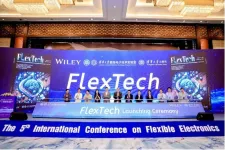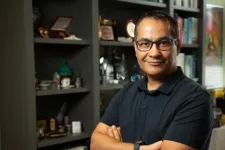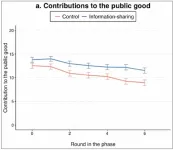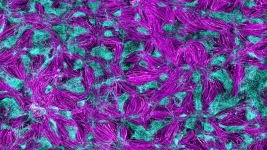(Press-News.org) A new study provides the latest data on the low rates for screening and documenting Social Determinants of Health (SDOH) in healthcare settings.
SDOHs are a person's social, environmental and economic conditions highly correlated with their health outcomes. This includes unemployment, homelessness and illiteracy, among many other factors. Although SDOHs can contribute to a more comprehensive understanding of a patient's health and inform important policy changes, clinical offices fall short of tracking this information.
To better understand the challenges of tracking social factors, researchers from the University of Colorado Anschutz Medical Campus and Johns Hopkins published new research today in Health Affairs Scholar that analyzes the use of Z-codes by code type, setting and patient demographics between Medicaid and commercial insurance beneficiaries. Z-codes are codes used to document SDOH information for patients.
“To better serve a more diverse population, there’s a critical need for healthcare offices to identify and appropriately document social factors impacting a patient’s health. However, when the system in place to track social factors is highly underutilized, it showcases a clear issue that needs to be addressed and we’re hoping our research can inform ways to do so,” said the study’s first author Jason Gibbons, PhD, assistant professor and a health economist in the Colorado School of Public Health at CU Anschutz.
The researchers found that less than two percent of both Medicaid and commercially insured patients received Z-codes in their records. However, they also found notable differences in the use of the codes between the programs and called attention to important findings:
Z-code use was more than 50% more prevalent among Medicaid beneficiaries than commercially insured beneficiaries.
Patients receiving Z-codes in Medicaid were more likely to receive Z-codes indicating economic hardship, while patients with commercial insurance were more likely to receive Z-codes representing issues with social relationships.
Mental health and psychiatric settings were the most common settings where Z-code use was identified in both programs.
Medicaid patients were more likely to receive Z-code diagnoses in the inpatient settings, while commercially insured patients were more likely to receive Z-code diagnoses in the outpatient setting.
“We’re hoping these results can help with current and future policy efforts to implement programs that address the needs of clinicians to document SDOHs better, whether they see Medicaid and commercially insured patients or both,” said Gibbons.
To incentivize and expand Z-code use, the researchers outline recommendations such as broader integration of Z-codes as quality metrics into quality improvement and equity programs being developed by Centers for Medicare & Medicaid Services (CMS) and states through section 1115 waivers, integration of Z-codes into clinical decision support tools and electronic health records systems that prompt providers to ask patients about SDOH and record responses.
Gibbons adds, “We also recommend provider education regarding the importance of accurately capturing patient SDOH and making them a focal point of clinical care wherever possible.”
To conduct this study, the researchers evaluated Z-code use using an administrative claims dataset processed by Kythera Labs, a large healthcare clearinghouse, from 2020-2021. The dataset had 409.7 million Medicaid claims (48.9 million patients) and 2.1 billion commercial claims (203.9 million patients).
The researchers say due to the need for more detailed information on patient and provider characteristics, this study can only explore some desired patient demographics and provider coding behavior, which are important topics for future research.
“Our study reveals a simple reality that warrants attention of healthcare stakeholders. When we lack money, it contributes to low health status. In a better financial situation, the presence or absence of love plays an important role in our health,” concludes author Ge Bai, PhD, CPA, professor of accounting and health policy at Johns Hopkins University.
About the University of Colorado Anschutz Medical Campus
The University of Colorado Anschutz Medical Campus is a world-class medical destination at the forefront of transformative science, medicine, education and patient care. The campus encompasses the University of Colorado health professional schools, more than 60 centers and institutes, and two nationally ranked independent hospitals - UCHealth University of Colorado Hospital and Children's Hospital Colorado - that treat more than two million adult and pediatric patients each year. Innovative, interconnected and highly collaborative, the University of Colorado Anschutz Medical Campus delivers life-changing treatments, patient care and professional training and conducts world-renowned research fueled by over $704 million in research grants. For more information, visit www.cuanschutz.edu.
END
Study provides new insight into low social determinants of health screening rates
Research details differences in Medicaid and commercially insured health plans
2023-12-19
ELSE PRESS RELEASES FROM THIS DATE:
FlexTech: A new era in flexible electronics research
2023-12-19
On December 9, 2023, the 5th International Conference on Flexible Electronics (ICFE 2023) was held in Hangzhou, China. The international academic journal, FlexTech, was officially inaugurated at this conference.
FlexTech is an initiative led by Tsinghua University, with academic support from the Laboratory of Flexible Electronics Technology Laboratory, Tsinghua University. This journal is co-published by Tsinghua University Press and John Wiley & Sons, Inc.
The editorial board of FlexTech is under the distinguished leadership of Professor Xue ...
Why do people age differently?
2023-12-19
CLEVELAND—Throughout our lives, changes in our DNA, called genetic mutations, occur in every healthy cell of the human body—mutations which have long been thought to be an important reason why our bodies age.
But it’s not known whether some people accumulate mutations at a faster or slower rate with age, and whether those differences might predict how long we live and the risk for aging-related diseases like cancer.
With a $3.5 million research project grant from the National Institutes of Health (NIH), Jonathan Shoag, a surgeon-scientist at the Case Western Reserve University School of Medicine and urologic oncologist at ...
Ali Khademhosseini named as 2023 National Academy of Inventors Fellow
2023-12-19
(LOS ANGELES) – December 18, 2023 - The National Academy of Inventors (NAI) has named Ali Khademhosseini, Ph.D., Director and CEO of the Terasaki Institute for Biomedical Innovation (TIBI), as a 2023 National Academy of Inventors Fellow. This distinctive honor is the highest professional award that is exclusively bestowed upon inventors. The Academy has chosen to honor him for his achievements and contributions to the innovation ecosystem, which vastly influences science, society, and the global economy. Dr. Khademhosseini will be formally recognized at the NAI thirteenth annual meeting on June 18, 2024, where he will be presented with a medal by a senior official from the United States ...
Information sharing and cooperation
2023-12-19
How is cooperation affected when people can receive secondhand information about what others are contributing? Ashley Harrell and Tom Wolff investigated this question through an online cooperation game. Participants were recruited from a large subject pool of university students and other adults, maintained by the Interdisciplinary Behavioral Research Center at Duke University. Over 200 participants were placed in groups of 6–10; however, each participant was only linked to some of the other participants. In the control condition, players could only see the contributions ...
How big events can disrupt public transit over an entire city
2023-12-19
COLUMBUS, Ohio – New technology has allowed scientists to see how a major sporting event can disrupt public transportation in an entire city for hours before and after the event.
Researchers conducted a case study in Columbus on days that The Ohio State University had home football games, attracting more than 100,000 fans to Ohio Stadium on the university’s campus.
Findings showed that bus service across the entire city was significantly less reliable for more than 7 hours on game days compared to other days, meaning that even bus riders who were not traveling near the university ...
Can AI think like a human?
2023-12-19
In a perspective, Athanassios S. Fokas considers a timely question: whether artificial intelligence (AI) can reach and then surpass the level of human thought. Typically, researchers have sought to measure the ability of computer models to accomplish complex goals, such as winning the game of Go or carrying on a conversation that seems human enough to fool an interlocutor. According to Fokas, this approach has a key methodological limitation. Any AI would have to be tested on every single conceivable human goal before anyone could claim that the program was thinking as well as a human. Alternative methodologies are therefore needed. In addition, the “complex goal” focus does not ...
AI in medical research: promise and challenges
2023-12-19
In an editorial, Monica M. Bertagnolli assesses the promise of artificial intelligence and machine learning (AI/ML) to study and improve health. The editorial was written by Dr. Bertagnolli in her capacity as director of the National Cancer Institute. AI/ML offer powerful new tools to analyze highly complex datasets, and researchers across biomedicine are taking advantage. However, Dr. Bertagnolli argues that human judgment is still required. Humans must select and develop the right computational models and ensure that the data used to train ...
First comprehensive medical guideline on management of pouchitis released
2023-12-19
Bethesda, MD (Dec. 19, 2023) — The American Gastroenterological Association (AGA) has released the first comprehensive evidence-based guideline on the management of pouchitis, the most common complication people with ulcerative colitis experience following surgery to remove their colon.
Between 150,000 and 300,000 people with ulcerative colitis in the U.S. live with a surgically created internal reservoir or “pouch” created from their small intestine as an alternate way to store and pass ...
A neuromuscular model for drug development
2023-12-19
Scientists have so far identified around 800 different neuromuscular diseases. These conditions are caused by problems in the way muscle cells, motor neurons and peripheral cells interact. These disorders, including amyotrophic lateral sclerosis and spinal muscular atrophy, lead to muscle weakness, paralysis, and in some cases death.
“These diseases are highly complex, and the causes of the dysfunction can vary widely,” says Dr. Mina Gouti, head of the Stem Cell Modeling of Development and Disease Lab at the Max Delbrück Center. The problem might lie with the neurons, the muscle cells or the connections between the two. ...
Chilean researchers pledge for transformative change to tackle climate action
2023-12-19
Addressing climate change has become a central issue in Chile’s public policy. As part of that debate, Dr. Maisa Rojas, researcher in Atmospheric Physics, who currently serves as Chilean Minister for Environment and Marco Billi of the Centre for Climate and Resilience Research, Universidad de Chile, propose a new model of governance at the country level to facilitate the changes needed. The proposal – written before Dr. Rojas’ appointment to the Chilean government – is published in IOP Publishing’s journal Environmental Research Letters.
The model proposed places climate action ...
LAST 30 PRESS RELEASES:
Engineered immune cells show promise against brain metastases in preclinical study
Improved EV battery technology will outmatch degradation from climate change
AI cancer tools risk “shortcut learning” rather than detecting true biology
Painless skin patch offers new way to monitor immune health
Children with poor oral health more often develop cardiovascular disease as adults
GLP-1 drugs associated with reduced need for emergency care for migraine
New knowledge on heritability paves the way for better treatment of people with chronic inflammatory bowel disease
Under the Lens: Microbiologists Nicola Holden and Gil Domingue weigh in on the raw milk debate
Science reveals why you can’t resist a snack – even when you’re full
Kidney cancer study finds belzutifan plus pembrolizumab post-surgery helps patients at high risk for relapse stay cancer-free longer
Alkali cation effects in electrochemical carbon dioxide reduction
Test platforms for charging wireless cars now fit on a bench
$3 million NIH grant funds national study of Medicare Advantage’s benefit expansion into social supports
Amplified Sciences achieves CAP accreditation for cutting-edge diagnostic lab
Fred Hutch announces 12 recipients of the annual Harold M. Weintraub Graduate Student Award
Native forest litter helps rebuild soil life in post-mining landscapes
Mountain soils in arid regions may emit more greenhouse gas as climate shifts, new study finds
Pairing biochar with other soil amendments could unlock stronger gains in soil health
Why do we get a skip in our step when we’re happy? Thank dopamine
UC Irvine scientists uncover cellular mechanism behind muscle repair
Platform to map living brain noninvasively takes next big step
Stress-testing the Cascadia Subduction Zone reveals variability that could impact how earthquakes spread
We may be underestimating the true carbon cost of northern wildfires
Blood test predicts which bladder cancer patients may safely skip surgery
Kennesaw State's Vijay Anand honored as National Academy of Inventors Senior Member
Recovery from whaling reveals the role of age in Humpback reproduction
Can the canny tick help prevent disease like MS and cancer?
Newcomer children show lower rates of emergency department use for non‑urgent conditions, study finds
Cognitive and neuropsychiatric function in former American football players
From trash to climate tech: rubber gloves find new life as carbon capturers materials
[Press-News.org] Study provides new insight into low social determinants of health screening ratesResearch details differences in Medicaid and commercially insured health plans





